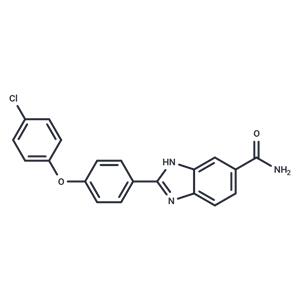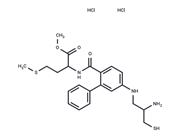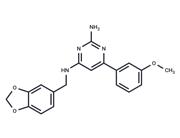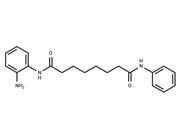| Name | BML-277 |
| Description | BML-277 (C 3742) is a selective checkpoint kinase 2 (Chk2) inhibitor. |
| Cell Research | BML-277 is dissolved in DMSO and stored, and then diluted with appropriate medium before use[1]. To determine the radioprotective effect of Chk2 inhibitors, purified T-cells are incubated at 100?000 cells per well in BML-277 (102.5 nM, 1 μM, 100.5 μM, 10 μM, and 101.5 μM) or vehicle (DMSO) at varying concentrations in 96-well stripwells for 1 h. Cells are then exposed to a dose of 0 or 10 Gy gamma irradiation from a 137Cs source at a dose rate of 3.65 Gy/min and then returned to the incubator for a further 24 h. Cells are stained with Annexin V-FITC and propidium iodide, according to the manufacturers protocol. Apoptotic and surviving cells are quantitated with a FACSCalibur FACS machine. Data are reported as percent recovery-or the number of survivors from treatment groups minus the number of cells surviving in the irradiated control group divided by the number of surviving cells in the untreated control groups[1]. |
| Kinase Assay | Activity of inhibitors of chk2 is determined by incubating inhibitory compounds with recombinant full-length chk2:? 5 nM recombinant human Chk2, 50 mM HEPES (pH 7.4), 100 mM NaCl, 10 mM MgCl2, 25 μM synthetic peptide substrate (biotin-SGLYRSPSMPENLNRPR, 1 μM ATP, 50 μCi/mL [γ-33P] ATP, and a protease inhibitor mixture. The reaction mixtures are incubated at 37°C for 3 h, and the peptide substrate is captured on streptavidin conjugated to agarose beads. The agarose beads are washed repeatedly with a 0.1% solution of Tween-20 in phosphate-buffered saline, pH 7.4. Enzyme activity at different BML-277 concentrations (6.25, 12.5, 25, 50, 100, and 200 nM) is determined by measuring the amount of radioactive phosphate bound to the substrate peptide by scintillation counting. In kinetic experiments ATP concentration is varied while the ratio between unlabeled and [γ-33P] labeled ATP is kept constant. Reactions are stopped at different time points by addition of 50 mM cold ATP and samples are kept on ice during further processing[1]. |
| In vitro | BML-277 is an ATP-competitive inhibitor of Chk2 that dose dependently protects human CD4+ and CD8+ T-cells from apoptosis due to ionizing radiation. BML-277 efficiently rescues both T-cell populations from radiation-induced apoptosis in a dose-dependent manner with an observed EC50 of 3?7.6 μM. The concentration of BML-277 required for radioprotection is consistent with the biochemical measurement of chk2 inhibition. Providing theKm of ATP for Chk2 is determined to be 99 μM and the Ki for BML-277 is 37 nM, and assuming that the intracellular ATP concentration is 10 mM, a 5 μM concentration of BML-277 would be expected to produce 42% inhibition of intracellular chk2[1]. |
| Storage | Powder: -20°C for 3 years | In solvent: -80°C for 1 year | Shipping with blue ice. |
| Solubility Information | DMSO : 50 mg/mL (137.44 mM)
|
| Keywords | inhibit | C3742 | Checkpoint Kinase (Chk) | Inhibitor | BML277 | C-3742 | Apoptosis | BML-277 |
| Inhibitors Related | Stavudine | 5-Fluorouracil | Acetylcysteine | Kaempferol | Myricetin | Sodium 4-phenylbutyrate | L-Ascorbic acid | Dextran sulfate sodium salt (MW 4500-5500) | Metronidazole | Sorafenib | Tributyrin | Lidocaine hydrochloride |
| Related Compound Libraries | Highly Selective Inhibitor Library | Apoptosis Compound Library | Bioactive Compound Library | Kinase Inhibitor Library | CNS-Penetrant Compound Library | Inhibitor Library | NO PAINS Compound Library | Anti-Aging Compound Library | Bioactive Compounds Library Max | Anti-Cancer Compound Library |

 United States
United States



